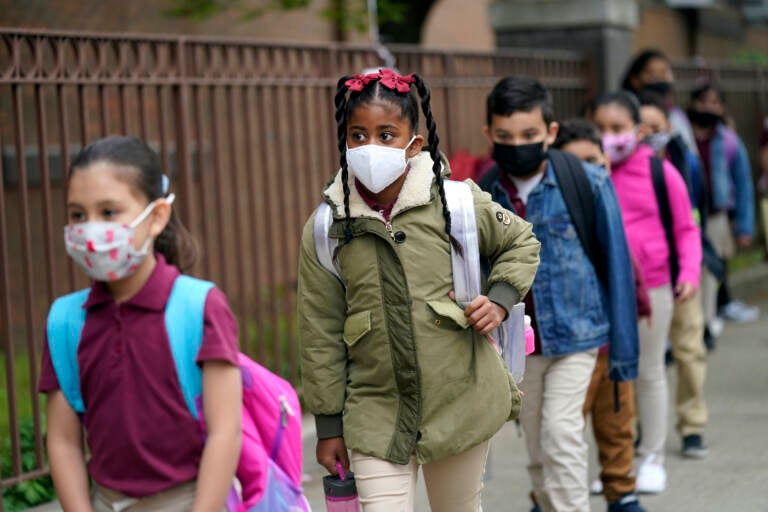Emergency department visits and admissions of children with respiratory illnesses are up at Delaware Valley hospitals
A number of circulating viruses are causing rising rates of respiratory infections in kids, with hospitals and ICUs seeing an uptick in admissions.

File photo: Students line up to enter Christa McAuliffe School in Jersey City, N.J., Thursday, April 29, 2021. (AP Photo/Seth Wenig, File)
Doctors at several Delaware Valley hospitals say activity from multiple viruses circulating at the same time are driving children to emergency departments with respiratory complications and illnesses, especially those who are already vulnerable to infection.
Federal and state agencies warned communities last month to be on the lookout for symptoms related to rhinovirus — the common cold — and enterovirus.
Now, local health providers say respiratory syncytial virus (RSV), anticipated influenza cases, and ongoing COVID-19 infections are making for a busy start to a fall and winter season of disease outbreaks.
“It’s a unique time. It’s unusual that at one particular moment in time, we’re seeing so many viruses prevalent throughout the community,” said Dr. Christopher Valente, chair of pediatric medicine at Reading Hospital. “A child can come in with a cough and fever for a few days, it could be any one of these viruses.”
Dr. James Reingold, chair of the Department of Emergency Medicine at St. Christopher’s Hospital for Children in Philadelphia, said the emergency room began to get busier last month.
“Many children coming in just gasping for breath,” he said.
About 67% of kids were testing positive for rhinovirus, which may cause no more than a runny nose, sneezing, congestion, or mild fever in a healthy child. But for kids with chronic conditions like asthma, the virus can trigger respiratory complications that need intensive care.
“I don’t think it’s necessarily making kids any sicker, but because we have a very ill population to start with, the severity was very significant,” Reingold said.
Dr. Magdy Attia, a pediatric emergency medicine physician and associate director of emergency medicine at Nemours Children’s Hospital, Delaware Valley, said the average daily volume at the emergency department increased about 20% in recent weeks.
Many cases have been linked to rhinovirus or enterovirus, but others have been due to RSV and COVID-19.
Dr. Julia Sammons said Children’s Hospital of Philadelphia has also experienced higher numbers of emergency department visits and admissions, but not from an unusual spike in cases of rhinovirus.
Instead, the hospital is seeing larger volumes COVID-19 and RSV — the latter of which doesn’t typically peak until late fall or early winter, said Sammons, assistant vice president of CHOP’s Office of Preparedness, Prevention and Response.
“Managing high volumes of patients during the fall and winter months is a known challenge for children’s hospitals and primary care clinics,” she said. “As the weather begins to cool, people move more indoors, and respiratory viruses begin to circulate more heavily in our communities.”
Reingold said viral activity in recent weeks has made beds in intensive care units scarce.
“Really there was at times nothing but asthma in our emergency department, between children waiting for beds and then the children that just kept coming in behind them,” he said. “We’ve definitely been getting calls asking to transfer children to us, and at times we have had to say no, which is really discouraging.”
Reingold said hospital beds are starting to open up again, just as cases of influenza begin to appear.
Health providers say there are steps families can take to protect their kids from serious illness, or get them to the right level of care when symptoms become worse.
Valente said a lot of these viral infections can be managed at home, but there are three main things to watch for that may signal a child’s illness is getting worse.
They include major behavioral changes, like excessive fussiness, irritability, sleepiness or lethargy; respiratory issues like wheezing, fast or labored breathing; and a change in appetite or an inability to stay hydrated.
Sammons and her colleagues at CHOP also recommend kids wash their hands frequently, stay home when they’re sick, and get up to date on their vaccines. Children as young as 6 months old are eligible for flu shots.
Attia added that families can also get help through primary care offices, urgent cares and through telemedicine.
“Parents should seek emergent evaluation if they feel their child is seriously ill and feel they can’t wait to speak to their pediatrician or wait for a visit the next day,” she said. “I always tell parents to follow their parental instincts and they will always be right.”

Get daily updates from WHYY News!
WHYY is your source for fact-based, in-depth journalism and information. As a nonprofit organization, we rely on financial support from readers like you. Please give today.






